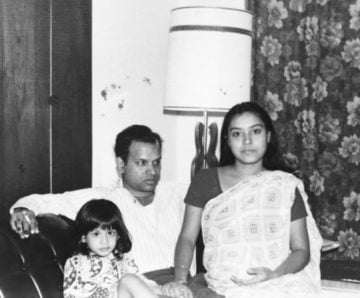On June 12, the body of a little girl from India was found in the Arizona desert. Her name was Gurupreet Kaur, and she was one month away from turning 7 years old. Temperatures in the desert had reached 108 degrees. Her mother had gone to look for water and never saw her daughter alive again.
More and more people from India are making the long, dangerous journey across land and sea to reach the United States. Nearly 9,000 migrants from India were apprehended at the southern border in fiscal year 2018 — triple the year before. They are just a sliver of the large swath of humanity on the move. According to a recent United Nations report, 2018 saw more than 70 million people displaced from their homes.
My family also came from India, but under very different circumstances. We arrived in 1972, after the Immigration and Nationality Act of 1965 overturned the racist National Origins Formula and made it easier for high-skilled labor from non-European countries to flow into the United States. We joined a nation of immigrants, but questions lingered in even the friendliest of interactions: What are you doing here? Why aren’t you doing it there, somewhere else where you belong?

I don’t actually know the reason my father wanted to leave India. To the extent that we talked about it before he passed away in 1993, I never got a full picture of his motives. There were frustrations in India and opportunities here, but it was so much more complicated than that. I often think his life in India would have been easier than it was in the United States, but he never talked about going back. He spent 21 years here working almost constantly — first as an engineer and later as the owner of a home remodeling company — until the day he died.
There are many reasons to leave India now. Droughts, floods and heat waves exacerbated by climate change are devastating many parts of the South Asian subcontinent, threatening the lives of millions of people. Whole cities are running out of drinking water. A right-wing Hindu fundamentalist government recently won reelection and has further marginalized religious minorities and people from oppressed Hindu castes. Indian women and girls face a higher risk of sexual violence than in any other country.
There are also many reasons not to come to the United States now. Trump and his administration are carrying out a campaign of ethnic cleansing around the country. It started with Immigration and Customs Enforcement (ICE) raids on undocumented immigrants, deliberately cruel family separations, swelling concentrations camps at the border and threats to deport a million people, but they will not stop there. They are casting a much wider net to stop the flow of nonwhite immigrants by denying H-1B visas to technical workers, tightening restrictions for the Diversity Visa Program and eliminating millions of family-based green card applications. More than that, Trump’s dangerous rhetoric has led to a spike in hate crimes. In one of the first racially motivated attacks after the election, a gunman killed Srinivas Kuchibhotla and wounded Alok Madasani, both Indian nationals.
This is no longer a world of choices or homelands, native or adopted. The division of the world into nation-states makes no sense when bombs and fuel and atmospheric CO2 move across the globe, but people can’t. In a world where humanity is straining to survive, cruelty as deterrence has disastrous consequences. It’s sending people into even more desperate migration routes, until they make it into a refugee or concentration camp or don’t make it at all. Last week, the world saw the photograph of the Salvadoran father and daughter who drowned in the Rio Grande. They had made it to the U.S. side of the river, but a tragic series of events put them in the path of a current that swept them away.
I don’t mourn Gurupreet Kaur because she came from India. I mourn her along with all the other children, whether they are from Guatemala or El Salvador or India or Syria, dying so young and so alone and so far from home. These are our children, and they deserve a better world, a world without borders, without these absurd and arbitrary lines dividing our lands and our hearts.







